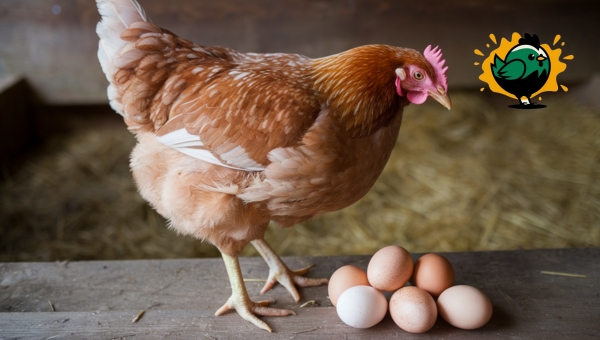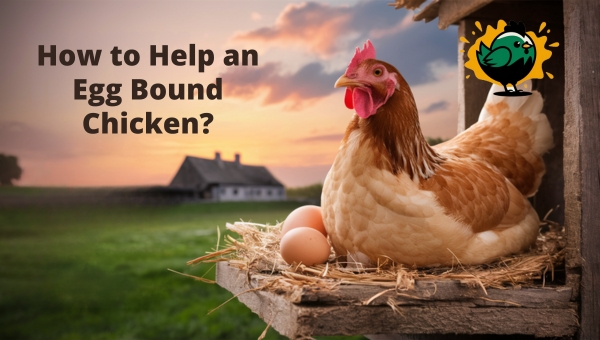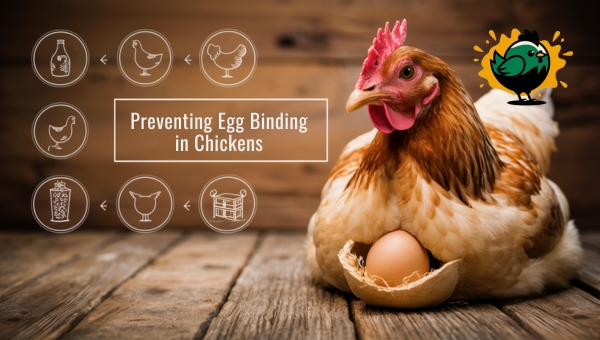Egg Bound Chicken | Essential Guide to Prevention and Care

You wake up one morning to find your favorite hen sitting unusually still, looking uncomfortable. As a responsible chicken keeper, you know something is wrong. After a bit of research, you realize she might be an Egg bound chicken.
This condition, where a hen struggles to pass an egg, can be serious if not addressed quickly. Let’s delve into the causes, symptoms, and steps you can take to help your feathered friend.
The Basics of Egg Binding in Hens
An egg bound chicken is a hen that struggles to lay an egg, which can lead to serious health issues. This condition arises when an egg gets stuck in the oviduct.

If not treated in time, it can become life-threatening for the hen. Understanding the causes and recognizing the symptoms is crucial for timely intervention. Let’s delve into the specifics of what causes this issue and how to identify it.
Causes of Egg Binding in Chickens
Egg binding can result from various factors related to the hen’s health and environment. Here are some common causes:
- Poor Diet: A lack of essential nutrients, especially calcium, can weaken the muscles needed for laying eggs.
- Oversized Eggs: Larger or misshapen eggs may not pass easily through the reproductive tract.
- Dehydration: Insufficient water intake can cause muscle cramping, making it difficult for the hen to lay the egg.
- Obesity: Overweight hens may have excess fat around their reproductive organs, complicating the egg-laying process.
- Inadequate Nesting Areas: Lack of comfortable and quiet nesting spaces can cause stress, leading to egg retention.
Symptoms of an Egg Bound Chicken
Recognizing the signs of an egg bound chicken is essential for prompt action. Look out for these symptoms:
- Lethargy: The hen may appear unusually tired or inactive.
- Straining: Frequent attempts to lay an egg without success, often accompanied by visible discomfort.
- Swollen Abdomen: The abdomen may look distended due to the trapped egg.
- Behavior Changes: Increased sitting or isolation from the flock, along with a droopy comb and wattles.
By understanding the causes and symptoms of egg binding, you can better care for your chickens and ensure their well-being.
Also Read: Top Rare Chicken Breeds | A Must-See for Enthusiasts
How to Help an Egg Bound Chicken?
Dealing with an egg bound chicken promptly is crucial for the bird’s health. Here is a detailed, step-by-step guide to assist you in helping your hen:

- Isolate the Hen:
- Place her in a quiet, warm area away from other chickens to reduce stress.
- Warm Bath:
- Fill a tub with warm (not hot) water and immerse her lower body for about 15-20 minutes. This helps relax her muscles.
- Gentle Abdominal Massage:
- With clean hands, gently massage her abdomen in a downward motion to encourage movement.
- Calcium Supplement:
- Offer crushed Tums or calcium carbonate to support muscle function. Calcium aids in contractions necessary for laying.
- Hydration:
- Ensure she has access to fresh water, possibly with electrolytes, to prevent dehydration.
- Monitor Progress:
- Observe her closely for signs of improvement or worsening symptoms. If she does not pass the egg within 24 hours, consult a veterinarian.
Also Read: Green Chicken Eggs – Genetics, Care, and Benefits
Preventing Egg Binding in Chickens
To prevent egg binding in chickens, follow these step-by-step guidelines that focus on diet, environment, and health monitoring:

Step 1: Provide a Balanced Diet
- Quality Layer Feed: Ensure your hens receive a high-quality layer feed that meets their nutritional needs. This feed should be rich in protein and calcium to support egg production.
- Calcium Supplements: Offer crushed oyster shells or calcium carbonate free-choice. This helps strengthen eggshells and supports muscle contractions needed for laying.
- Limit Treats: Avoid excessive treats or scraps that can lead to obesity and disrupt their balanced nutrition.
Step 2: Ensure Proper Hydration
- Fresh Water Access: Always provide clean, fresh water for your hens. Dehydration can contribute to egg binding, so ensure they drink enough daily.
- Electrolyte Solutions: Consider adding electrolytes to their water, especially during hot weather or stress, to keep them hydrated.
Step 3: Maintain a Stress-Free Environment
- Adequate Space: Ensure your chickens have enough room to roam and exercise. Overcrowding can lead to stress and increase the risk of egg binding.
- Comfortable Nesting Areas: Provide sufficient nesting boxes (one box for every 3-4 hens) that are clean and comfortable. This encourages hens to lay eggs without stress.
- Quiet and Clean Coop: Keep the coop clean and minimize disturbances. A calm environment helps reduce anxiety in hens.
Step 4: Encourage Regular Exercise
- Free Range Opportunities: Allow your chickens to free-range if possible. This promotes physical activity, which is important for their overall health and reduces the chances of obesity.
- Interactive Enrichment: Provide toys or activities that encourage movement and stimulate natural behaviors.
Step 5: Conduct Regular Health Monitoring
- Daily Observations: Spend time with your flock daily to monitor their behavior and health. Look for signs of lethargy or changes in laying patterns.
- Health Checks: Regularly check for any signs of illness or distress, such as changes in appetite, droopy wings, or abnormal postures.
Step 6: Educate Yourself on Breed Characteristics
- Know Your Breeds: Be aware of the specific needs and predispositions of the breeds in your flock. Some breeds may be more prone to egg binding than others.
By following these steps diligently, you can significantly reduce the risk of egg binding in your chickens and promote a healthier, happier flock.
Also Read: Why Chickens Stop Laying Eggs – Key Factors Explained
Risks and Complications of Egg Binding
Egg binding in chickens is a critical issue that can lead to severe health problems if not addressed promptly. Understanding the potential risks and complications is essential for any chicken keeper. Let’s delve into the specific dangers and long-term effects of egg binding.
Dangers of Untreated Egg Binding
When an egg bound chicken is not treated, the risks can be dire. Here are some of the dangers associated with untreated egg binding:
- Infection: Bacteria can enter the reproductive tract, leading to serious infections. This can further complicate the hen’s condition and requires immediate attention.
- Egg Peritonitis: This is a life-threatening condition where the yolk spills into the abdominal cavity. It can cause severe inflammation and is challenging to treat.
- Death: Without timely intervention, an egg-bound chicken can succumb to the condition. The stress and physical strain can be overwhelming for the hen, making it vital to act quickly.
Long-Term Effects on Egg Production
Egg binding doesn’t just have immediate risks; it can also impact a chicken’s future egg-laying capabilities and overall health.
Here are the potential long-term effects:
- Reduced Laying Ability: Chronic egg binding can weaken the hen’s reproductive system, leading to a decrease in egg production. The hen may lay fewer eggs or stop laying altogether.
- Overall Health Decline: Repeated episodes of egg binding can weaken the hen’s general health. This can make her more susceptible to other diseases and reduce her lifespan.
By understanding these risks and complications, you can take appropriate measures to prevent and treat egg binding in your flock, ensuring your chickens remain healthy and productive.
FAQs
How long can a chicken be egg bound before it becomes life-threatening?
A chicken can become life-threateningly egg bound within 24 to 48 hours if not treated promptly. Immediate intervention is crucial to avoid severe health risks.
What is the best diet to prevent egg binding in chickens?
The best diet to prevent egg binding includes calcium-rich foods like crushed oyster shells and leafy greens. Ensuring proper hydration and balanced nutrition is also essential.
Can egg binding be a recurring issue?
Yes, egg binding can be a recurring issue, particularly if underlying causes like poor diet or inadequate living conditions are not addressed. Regular monitoring and preventive measures are key to managing this condition.
Conclusion
Understanding and addressing the issue of an egg bound chicken is crucial for maintaining your flock’s health. By recognizing the causes, symptoms, and treatment options, you can ensure your chickens remain healthy and productive.
Regular monitoring and preventive measures can significantly reduce the risk of egg binding, helping your hens lead comfortable lives. For more insights and tips on chicken care, be sure to explore our other blogs. Stay informed and keep your flock thriving!
